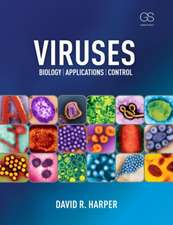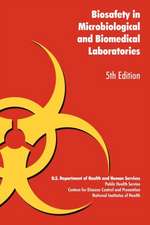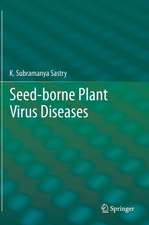Recombinant Protein Production with Prokaryotic and Eukaryotic Cells. A Comparative View on Host Physiology: Selected articles from the Meeting of the EFB Section on Microbial Physiology, Semmering, Austria, 5th–8th October 2000
Editat de Otto-Wilhelm Merten, D. Mattanovich, C. Lang, G. Larsson, P. Neubauer, D. Porro, P. Postma, J. Teixeira de Mattos, J.A. Coleen Limba Engleză Paperback – dec 2010
| Toate formatele și edițiile | Preț | Express |
|---|---|---|
| Paperback (1) | 1216.91 lei 6-8 săpt. | |
| SPRINGER NETHERLANDS – dec 2010 | 1216.91 lei 6-8 săpt. | |
| Hardback (1) | 1228.62 lei 6-8 săpt. | |
| SPRINGER NETHERLANDS – 30 noi 2001 | 1228.62 lei 6-8 săpt. |
Preț: 1216.91 lei
Preț vechi: 1484.04 lei
-18% Nou
Puncte Express: 1825
Preț estimativ în valută:
232.89€ • 241.29$ • 194.36£
232.89€ • 241.29$ • 194.36£
Carte tipărită la comandă
Livrare economică 21 martie-04 aprilie
Preluare comenzi: 021 569.72.76
Specificații
ISBN-13: 9789048157563
ISBN-10: 9048157560
Pagini: 416
Ilustrații: X, 400 p.
Dimensiuni: 155 x 235 x 22 mm
Greutate: 0.58 kg
Ediția:Softcover reprint of hardcover 1st ed. 2001
Editura: SPRINGER NETHERLANDS
Colecția Springer
Locul publicării:Dordrecht, Netherlands
ISBN-10: 9048157560
Pagini: 416
Ilustrații: X, 400 p.
Dimensiuni: 155 x 235 x 22 mm
Greutate: 0.58 kg
Ediția:Softcover reprint of hardcover 1st ed. 2001
Editura: SPRINGER NETHERLANDS
Colecția Springer
Locul publicării:Dordrecht, Netherlands
Public țintă
ResearchCuprins
Cell-free translation systems.- Protein synthesis and co-translational folding in cell-free translation systems.- Metabolic burden and stress response.- The cellular response to unfolded proteins in the endoplasmic reticulum.- The effects of recombinant protein expression on the growth and metabolism of mammalian cells.- Mapping stresses in Escherichia coli to improve yield. Examining global gene regulation and « cell conditioning » strategies.- Cellular responses to strong overexpression of recombinant genes in Escherichia coli. DNA relaxation and cell death after induction of ?-glucosidase.- From Vitreoscilla hemoglobin (VHb) to a novel class of growth stimulating hemoglobin proteins.- Genetic stability and gene copy number effects.- Protein mass production in hybridomas and recombinant CHO cells.- Inducible gene copy number amplification for the production of heterologous proteins in Kluyveromyces lactis.- Antibiotic-free plasmid selection and maintenance in Bacteria.- Modelling of segregational plasmid instability of recombinant strain suspension of Escherichia coli.- Transcription, translation, and product formation in E. coli.- Production of optically pure aryl epoxides by recombinant E. coli carrying styrene monooxygenase. A new biocatalyst based on Pseudomonas fluorescens ST genes.- Translational problems associated with the rare arginine CGG in Escherichia coli. Frameshifhting at CGG codons.- Optimisation of the solubility of the recombinant Itk kinase domain in Escherichia coli.- Bacterial senescence and the oxidation paradox.- Metabolic approaches for the optimisation of recombinant fermentation processes.- Control and optimisation of cellular bottlenecks in recombinant protein production.- Expression and fermentation strategies for recombinant proteinproduction in Escherichia coli.- Transcription, translation, and product formation in microbial systems other than E. coli.- Overexpression of a Rhizopus oryzae lipase in Pichia pastoris strains containing multiple copies of the target gene.- Development of a heterologous gene expression system for use in Lactococcus lactis. A novel gram-positive expression system.- Metabolic network analysis for human therapeutic protein productions: effects of the P/O ratio.- Animal cell based expression systems — process optimisation.- Process-orientated metabolic engineering: cell lines with new properties in nutrient exploitation and protein glycosylation.- Influence of the metabolic status of packaging cells on retroviral vector production.- Optimizing the production of recombinant prion protein from CHO cells.- Recombinant protein production by transient transfection of suspension-growing cells.- Comparison of different microbial expression systems.- Production of recombinant human trypsinogen in Escherichia coli and Pichia pastoris. A comparison of expression systems.- Secretion of homologous and heterologous recombinant proteins in Escherichia coli and other gram-negative bacteria by using a new secretion system.- Monitoring of genes that respond to overproduction of insoluble recombinant proteins in Escherichia coli and Bacillus subtilis.- Model supported optimization of fed-batch fermentations for recombinant protein production.- Protease secretion capacity and performance analysis of recombinant Bacillus species.- Authors Index.





